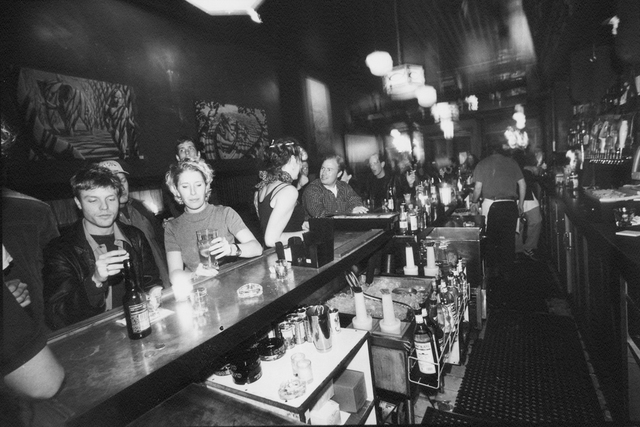THE TALKING HEADS sang that “Heaven is a place where nothing ever happens.” Well, close. Turns out heaven is a place where only one thing ever happens, over and over and over. In the new film from Japanese director Hirokazu Kore-eda (who made the 1996 grieving-‘n’-loss cult hit Maborosi), the dead find themselves in an afterlife that looks a lot like a dilapidated college dorm. They are greeted by deferential, soft-spoken staff: “You died yesterday. I’m sorry for your loss.” They are told that they have three days to choose the most important moment of their lives. The staff will then make a film of that moment. The dead will watch the film of their chosen moment, then disappear into eternity . . . accompanied only by that single memory.
After Life
directed by Hirokazu Kore-eda
starts Friday at the Varsity
In hushed schoolrooms, the dead address the camera with their memories, sorting around for just the right one. One kind-faced old lady remembers her favorite red dress from when she was a girl. “The sleeves were puffed.” A randy old gentleman insists, “For a man, it’s when you’re doing it. Ask anybody.” Another man remembers the approach of his girlfriend on her bicycle: “When I heard that ding ding, I knew she was coming. I loved the sound of that bell.” A happy-faced man describes the clouds he could see from his Cessna: “Not too big and not too small. A size that wasn’t frightening.” And one old woman, with a face like a baby, stares out the window. She wanders onto the grounds to collect gingko leaves.
Just as William Carlos Williams contends that “so much depends upon a red wheelbarrow,” Kore-eda clearly believes in the salvation of images, the images dear to these dead. The obviously filmic thing to do would have been to recreate these memories—we know he is capable of making beautiful images from his work in the glorious-to-look-at Maborosi.
But Kore-eda depends instead, like a playwright, on his dead characters’ words to create the images in our minds. This is a cinema of denial: He refuses to give us pictures. All we get is the cold, drifting light of the dormitory and the cheery, ordinary faces of the storytellers as they describe the bamboo grove, the salty rice. After Life is resolutely plain, like a zipperless gray Amish frock.
This translation of image into word is the first brick in Kore-eda’s project here: to suggest that the very meaning of memory lies in its fragility. Memories are broken in their telling; their reconstruction into words is just as beautiful and important as the original memory itself. It is this process Kore-eda has set out to capture as the dead describe their images, and the celestial filmmakers try to recreate them in little movies.
The angelic auteurs stay up late at night planning their shots. Quantities of tea are consumed as they argue over details. “The chicken rice is important. It symbolizes her relationship with her brother.” Kore-eda (who, not incidentally, is an accomplished documentary-maker) uses a handheld camera to document these documentarians; it all feels very “the making of”-ish. If After Life were an American film, the angel filmmakers would turn out perfect little films with swell special effects. The studio lot would bustle. Instead, they operate on a shoestring budget: The clouds that fly past the Cessna are pieces of cotton batting strung onto wire.
Here, Kore-eda’s film expands into a lively, witty network of allegory: It’s not just about memory, it’s about filmmaking; it’s about documentaries; it’s about non-American cinema, underfunded and endlessly inventive. Associations fly like Cessnas.
The dead are thrilled, the filmmakers excited. Soon everyone is trooping through the dormitory’s snowy courtyard into a screening room to view their moment. As the dead passed from the movie theater into eternity, I would have been content to pass from the movie theater back into my life. But Kore-eda has another kind of eternity in mind for the audience, in the form of a long, sentimental coda. At the last moment he chooses to amplify this film’s weakest note: plot. A backstory love triangle among the dead and the angelic staff is explored, sounding a sentimental chord that wears the patience. We don’t want more story at the end of this film; we want to go home and sort through our own small store of memories.





